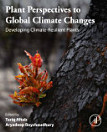Omics Approach to Manage Abiotic Stress in Cereals
About this ebook
About the author
Dr. Aryadeep Roychoudhury is Assistant Professor at the Department of Biotechnology, St. Xavier’s College (Autonomous), Kolkata, West Bengal, India. He received his B.Sc. (Hons.) in Botany from Presidency College, Kolkata, M.Sc. in Biophysics and Molecular Biology, University of Calcutta, and Ph.D. from Bose Institute, Kolkata, under Jadavpur University. Dr. Roychoudhury is currently handling several government-funded projects on abiotic stress responses in rice. He has published over 200 articles in peer-reviewed journals and as book chapters, and already edited 7 books from reputed publishers. He is the recipient of the Young Scientist Award 2019, conferred upon him by International Foundation for Environment and Ecology, and his name is included in the Stanford University List of World's Top 2% Scientists.
Dr. Tariq Aftab received his Ph.D. in the Department of Botany at Aligarh Muslim University, India, and is currently an Assistant Professor there. After completing his doctorate, he has worked as Research Fellow at National Bureau of Plant Genetic Resources, New Delhi and as Post-doctorate Fellow at Jamia Hamdard, New Delhi, India. Dr. Aftab also worked as Visiting Scientist at Leibniz Institute of Plant Genetics and Crop Plant Research (IPK), Gatersleben, Germany, and in the Department of Plant Biology, Michigan State University, USA. He has edited a number of books with with international publishers, and published over 50 research papers in international journals.
Prof. Krishnendu Acharya is former Head, Department of Botany, University of Calcutta. He obtained his master's degree in Botany from University of Calcutta, M.Tech. in Biotechnology and Ph.D. from Jadavpur University. His career has been marked by numerous awards and achievements. His name has been included in the Stanford List of World's Top 2% Scientists. He has established his research career in diverse fields which involves Macrofungai diversity and medicinal prospects; Innate immunity in plants and Myco-nanotechnology. He has a research experience of over 25 years with more than 350 research publications, 6 books and 4 (3 Applied) patents.







